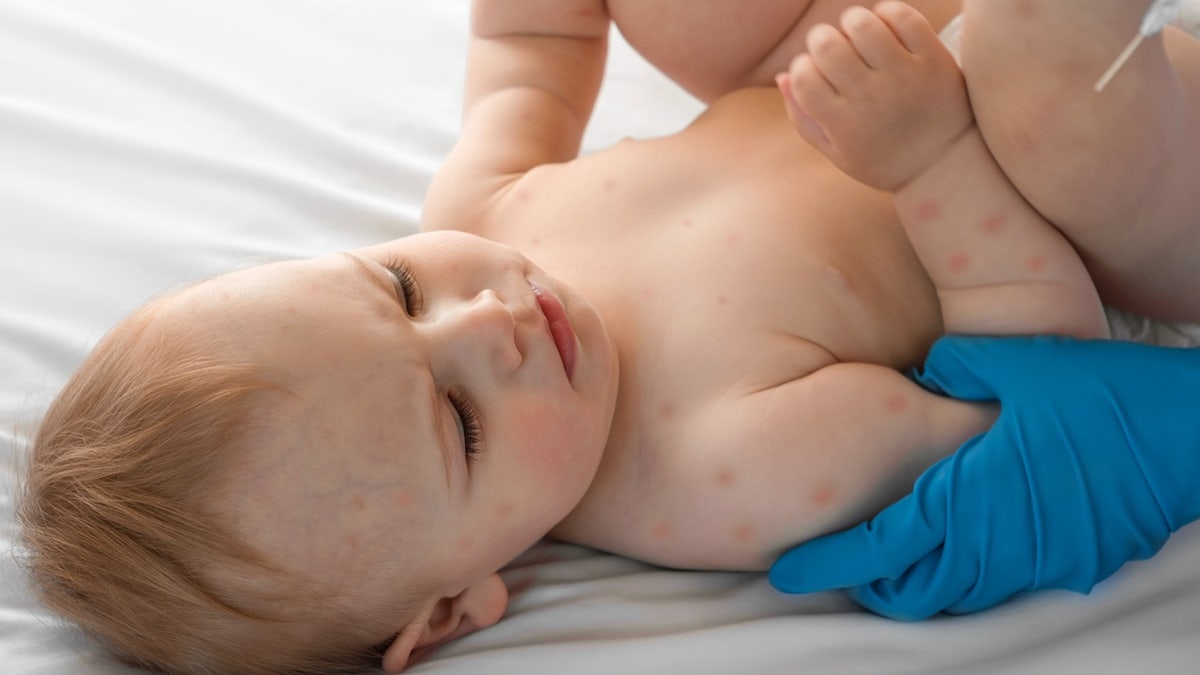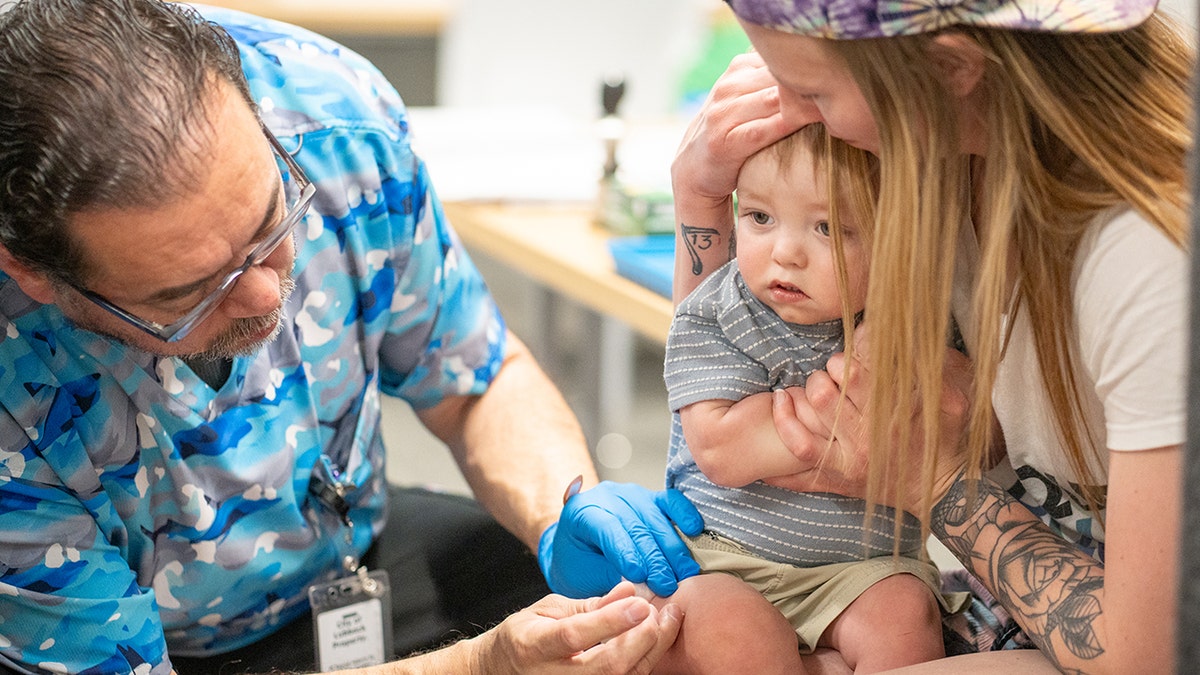As cases of measles continue to spread throughout the United States, with 12 states reporting official outbreaks, according to the latest CDC data, the concern grows between high risk groups.
Children under 5 are the most vulnerable to measles, confirm health experts.
The CDC recommends that children receive two doses of the MMR vaccine (measles-mumps-rubella), starting with the first dose of 12 to 15 months of age and a second dose of 4 to 6 years of age.
About us arises measles: see which states have reported cases
This means that children under 5 may not have complete protection.
As cases of measles continue to spread throughout the United States, with 12 states reporting official outbreaks, according to the latest CDC data, the concern grows between high risk groups. (Istock)
Allison Croucher, DO, pediatrician and doctor of osteopathic medicine with proper health and care in Illinois, said he often receives questions from parents worried about protecting their children from the highly contagious virus.
Chroucher shared some of the most common queries he receives, along with his answers.
1. Should you be worried about measles where I live or where do I travel?
Measles Houses have been reported in 20 States SO (ACCORDING TO THE CDC): Alaska, Arkansas, California, Colorado, Florida, Georgia, Hawaii, Illinois, Indiana, Kansas, Kentucky, Louisiana, Maryland, Michigan, Minnesota, Missouri, Montana, New Jersey, New Mexico, New York, New York, New Mexico York State, Ohio, Oklahoma, Pennsylvania, Rhode Island, Tennessee, Texas, Vermont, Virginia and Washington.

Children under 5 are the most vulnerable to measles, confirm health experts. (Istock)
Even if you do not live in one of these areas, watch out for local health alerts, as the disease evolves rapidly.
The website of the Department of Health of your State, which should end in “.gov”, is a great place to start. If you are planning to travel to an area with reported cases, you will ensure -you have to look for your doctor in advance.
2. How can I know if my child is fully vaccinated?
A child is considered completely vaccinated for measles if they have received two measles of measles, the Rubèola (MMR) vaccine at least four weeks apart.
The first dose is usually given to children between 12 and 15 months, followed by the second of four to six years.

In the early stages, the symptoms to consider include fever, cough, running nose and red eyes and irritation. (Istock)
3. Can my baby get the vaccine soon?
In certain cases, yes. Babies who are at high risk or traveling to areas with active cases may be eligible to achieve the MMR vaccine between six months and 12 months of age. This depends on individual circumstances, so it is important to talk to your pediatrician.
Please note that an early dose does not have the regular vaccination schedule – your child will still need two additional doses after the first birthday.
Another state confirms the case of measles with the infected child in the first year
4. What if my baby is too young to get the MMR vaccine?
If your baby is too young for the vaccine, it is important to take additional precautions to limit their exposure to others who are sick. Don’t be afraid to reject travel or meetings – you have every right to protect your child’s health.
5. How soon my son can get his second MMR vaccine?
For children over a year old, the second MMR dose can occur up to four weeks after the first. Once the two doses are received, the children are considered completely vaccinated and do not need any additional doses.
“One to three out of 1,000 children infected with measles will die due to complications of the disease.”
6. We have been around others who have recently traveled. What symptoms should we be careful?
In the early stages, the symptoms to consider include fever, cough, running nose and red eyes and irritation.
These symptoms usually appear seven to 14 days after the initial exposure.
7. My son shows signs of cold. Could it be that of early measles?
It is not always easy to say, as measles shares symptoms with many other diseases. A key differentiating is that children with measles usually show very high fevers, around 104 ° F. They are also usually very annoying.
Click here to get the Fox News app
Around the second or third day of symptoms, many patients develop small and bluish spots of their inner cheeks, called Koplik spots, although not all children will develop these points. The Telltale red eruption typically develops three to five days in the disease.

A child is considered completely vaccinated for measles if they have received two measles of measles, the Rubèola (MMR) vaccine at least four weeks apart. (Jan Sonnenmair/Getty Images)
8. How is the eruption of measles?
This rash usually starts three to five days after the initial symptoms. It starts like small spots on the face near the hair line, then propagates down and can cover the whole body.
9. Why is the measles dangerous?
Measles can have a lot of complications, ranging from slight to serious. About one in ten people will develop ears or diarrhea infections.
About one in five non -vaccinated children with measles will require hospitalization. Up to one in 20 children will hire pneumonia, which is the most common cause of death from the disease.
Click here to register -you are in our health newsletter
Around 1,000 children will develop encephalitis or inflammation and swelling of the brain. This can lead to seizures, disability of a lifetime or even death. In total, one to three out of 1,000 children infected with measles will die from complications of the disease.
10. Why do some people not get their children the MMR vaccine?
There is an increasing amount of misinformation and misinformation that circulate on vaccines, which has made some parents delay or jump completely.
The MMR vaccine has safely managed millions of people and has an excellent security history, and the research has repeatedly rejected the myth that the vaccine is related to autism.
For more health items, visit www.foxnews.com/health
11. What do I have to do if I think my son can have measles?
Don’t wait: please contact your doctor right away. They can guide you around the next steps.
The previous questions and answers were provided by Allison Croucher, DO, a pediatrician and a doctor of osteopathic medicine with health and care duly in Illinois.
#pediatrician #questions #measles
Image Source : www.foxnews.com
